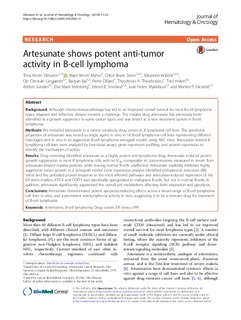| dc.contributor.author | Våtsveen, Thea Kristin | |
| dc.contributor.author | Myhre, Marit Renee | |
| dc.contributor.author | Steen, Chloe Beate | |
| dc.contributor.author | Wälchli, Sébastien | |
| dc.contributor.author | Lingjærde, Ole Christian | |
| dc.contributor.author | Bai, Baoyan | |
| dc.contributor.author | Dillard, Pierre | |
| dc.contributor.author | Theodossiou, Theodossis | |
| dc.contributor.author | Holien, Toril | |
| dc.contributor.author | Sundan, Anders | |
| dc.contributor.author | Inderberg, Else Marit | |
| dc.contributor.author | Smeland, Erlend B | |
| dc.contributor.author | Myklebust, June | |
| dc.contributor.author | Oksvold, Morten Pedersen | |
| dc.date.accessioned | 2018-12-12T14:58:02Z | |
| dc.date.available | 2018-12-12T14:58:02Z | |
| dc.date.created | 2018-07-08T13:11:38Z | |
| dc.date.issued | 2018 | |
| dc.identifier.citation | Journal of Hematology & Oncology. 2018, 11:23 1-12. | nb_NO |
| dc.identifier.issn | 1756-8722 | |
| dc.identifier.uri | http://hdl.handle.net/11250/2577468 | |
| dc.description.abstract | Background
Although chemo-immunotherapy has led to an improved overall survival for most B-cell lymphoma types, relapsed and refractory disease remains a challenge. The malaria drug artesunate has previously been identified as a growth suppressor in some cancer types and was tested as a new treatment option in B-cell lymphoma.
Methods
We included artesunate in a cancer sensitivity drug screen in B lymphoma cell lines. The preclinical properties of artesunate was tested as single agent in vitro in 18 B-cell lymphoma cell lines representing different histologies and in vivo in an aggressive B-cell lymphoma xenograft model, using NSG mice. Artesunate-treated B lymphoma cell lines were analyzed by functional assays, gene expression profiling, and protein expression to identify the mechanism of action.
Results
Drug screening identified artesunate as a highly potent anti-lymphoma drug.Artesunate induced potent growth suppression in most B lymphoma cells with an IC50 comparable to concentrations measured in serum from artesunate-treated malaria patients, while leaving normal B-cells unaffected. Artesunate markedly inhibited highly aggressive tumor growth in a xenograft model. Gene expression analysis identified endoplasmic reticulum (ER) stress and the unfolded protein response as the most affected pathways and artesunate-induced expression of the ER stress markers ATF-4 and DDIT3 was specifically upregulated in malignant B-cells, but not in normal B-cells. In addition, artesunate significantly suppressed the overall cell metabolism, affecting both respiration and glycolysis.
Conclusions
Artesunate demonstrated potent apoptosis-inducing effects across a broad range of B-cell lymphoma cell lines in vitro, and a prominent anti-lymphoma activity in vivo, suggesting it to be a relevant drug for treatment of B-cell lymphoma. | nb_NO |
| dc.language.iso | eng | nb_NO |
| dc.publisher | BMC (part of Springer Nature) | nb_NO |
| dc.rights | Navngivelse 4.0 Internasjonal | * |
| dc.rights.uri | http://creativecommons.org/licenses/by/4.0/deed.no | * |
| dc.title | Artesunate shows potent anti-tumor activity in B-cell lymphoma | nb_NO |
| dc.title.alternative | Artesunate shows potent anti-tumor activity in B-cell lymphoma | nb_NO |
| dc.type | Journal article | nb_NO |
| dc.type | Peer reviewed | nb_NO |
| dc.description.version | publishedVersion | nb_NO |
| dc.source.pagenumber | 1-12 | nb_NO |
| dc.source.volume | 11:23 | nb_NO |
| dc.source.journal | Journal of Hematology & Oncology | nb_NO |
| dc.identifier.doi | 10.1186/s13045-018-0561-0 | |
| dc.identifier.cristin | 1596236 | |
| dc.description.localcode | © The Author(s). 2018 Open Access This article is distributed under the terms of the Creative Commons Attribution 4.0 International License (http://creativecommons.org/licenses/by/4.0/) | nb_NO |
| cristin.unitcode | 194,65,15,0 | |
| cristin.unitname | Institutt for klinisk og molekylær medisin | |
| cristin.ispublished | true | |
| cristin.fulltext | original | |
| cristin.qualitycode | 1 | |

